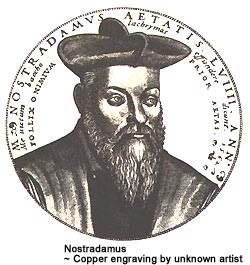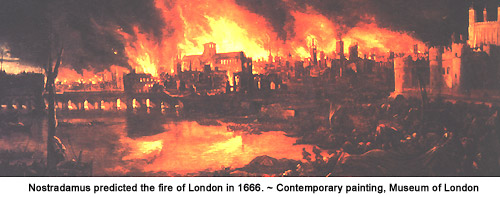A skilled physician fascinated by the occult
The lively little fellow with the long, thick beard cut a curious figure at the sumptuous Renaissance court of King Henry II of France.
 Known as the son of converted Jews, a dabbler in astrology and other questionable arts, Nostradamus had been invited to Paris in 1556 to provide exotic diversion. But his prophecies about the ruler were destined to make him internationally famous. One of them seemed straightforward but obviously preposterous, suggesting that "a one-eyed man" would soon be king. The other was characteristically cryptic, open to interpretation: "The young lion will overcome the older one, in a field of combat in single fight. He will pierce his eyes in their golden cage; two wounds in one, then he dies a cruel death."
Known as the son of converted Jews, a dabbler in astrology and other questionable arts, Nostradamus had been invited to Paris in 1556 to provide exotic diversion. But his prophecies about the ruler were destined to make him internationally famous. One of them seemed straightforward but obviously preposterous, suggesting that "a one-eyed man" would soon be king. The other was characteristically cryptic, open to interpretation: "The young lion will overcome the older one, in a field of combat in single fight. He will pierce his eyes in their golden cage; two wounds in one, then he dies a cruel death."On July 1, 1559, as the king jousted in a knightly tournament, a freak accident sent his friendly opponent's lance through the royal gold helmet into his left eye. The horrified Comte de Montgomery was younger than his sovereign; the splintering weapon made a second gash in the king's throat; and Henry would endure agonizing pain until his death 10 days later. During that period, he would become - and has remained - the only one-eyed ruler of France.
The words of Nostradamus were recalled with awe. Implacably opposed to magicians and sorcerers, leaders of the Roman Catholic Church were inclined to burn this dangerously accurate prophet at the stake. Peasants, thinking the prediction had actually been a curse, set him ablaze in effigy. Only the protection of the widowed Queen Catherine saved him from execution.
Hero of the Plague
Born Michel de Notredame on December 14, 1503, at Saint-Remy in Provence, history's most controversial seer set out to become a physician. However, his studies were abruptly curtailed when bubonic plague swept through the south of France in 1525. As many of the area's doctors fled in panic, Michel bravely traveled about to treat the victims of the highly contagious disease. Nonetheless, he was almost denied a license upon his graduation four years later, perhaps because of charges brought by jealous colleagues. But the gratitude of the peasantry and respect of his fellow students led to his reinstatement. Setting up practice in Agen, a town on the Garonne River, in 1533, he married a young woman said to be "of high estate, very beautiful and admirable." They were raising a son and daughter when the Inquisition, the church office bent on suppressing heresy, intervened in their lives. Nostradamus (as he now called himself) had been ordered to appear before a church court, purportedly for making a disrespectful remark about a statue of the Virgin Mary. When he returned, a resurgence of the plague claimed the lives of his wife and both their children. For the next decade the compassionate physician once again became an itinerant caregiver, acquiring the reputation of a miracle-worker. After being awarded a lifetime pension, he settled in Salon, halfway between Marseilles and Avignon, set up a business producing cosmetics, and married a wealthy widow who bore him six children.
Setting up practice in Agen, a town on the Garonne River, in 1533, he married a young woman said to be "of high estate, very beautiful and admirable." They were raising a son and daughter when the Inquisition, the church office bent on suppressing heresy, intervened in their lives. Nostradamus (as he now called himself) had been ordered to appear before a church court, purportedly for making a disrespectful remark about a statue of the Virgin Mary. When he returned, a resurgence of the plague claimed the lives of his wife and both their children. For the next decade the compassionate physician once again became an itinerant caregiver, acquiring the reputation of a miracle-worker. After being awarded a lifetime pension, he settled in Salon, halfway between Marseilles and Avignon, set up a business producing cosmetics, and married a wealthy widow who bore him six children.Revelations in the Attic
As his newfound financial security made continued medical practice unnecessary, Nostradamus turned to the mystical arts. The small-town "barbarians," as he called his neighbors, viewed his interest in magic and astrology with suspicion. He converted his attic into a celestial observatory where, perched on a tripod, he contemplated the starry vaults of the heavens and claimed to receive the secrets of the future from "the internal light, the voice."At first, he confined his predictions to the pages of a series of almanacs he began publishing in 1550, as was common practice at the time. Gradually, however, he completely lost interest in the mundane pursuit of forecasting the weather and changes of the moon.
Shrouded in Obscurity
Teetering on the brink of religious civil war, France offered fertile soil for the grim and cryptic prophecies Nostradamus published in 1555 the first 100 of nearly 2,000 he would have in print by 1557. These Centuries were an instant success and led to his court appointment.Admitting that he had purposely chosen "a secretive way of expression," Nostradamus wrote in an obscure argot, grounded in contemporary French but larded with words and phrases from Italian, Greek, Spanish, Hebrew, and Latin. Each of the predictions was a four-line verse, or quatrain, though none reveals a flair for poetry. The seer himself claimed that this nearly unfathomable style protected him from the punishment of the mighty, who were not always likely to be pleased with what he saw in their futures. More skeptical observers have suggested that the vagueness was a deliberate evasion, leaving the writing open to various interpretations after the fact. In consequence, perhaps, almost 400 different interpretations of the Centuries have been produced, each trying to unlock the specific secrets of prophecies that continue up to the year 3797. "My writings will be better understood by those who come after my death," wrote the sage.

Adviser to Royalty
In troubled France there were many, like Queen Catherine, who did not feel the need to wait for history's vindication of the prescient physician. His prediction about her late husband was enough. Undoubtedly, she was responsible for his appointment as physician-in-ordinary to her son, King Charles IX.According to one popular story, Nostradamus once summoned an angel named Anael and asked him to reveal the fates of the queen's children in a magic mirror. Her three sons were shown reigning briefly, while her despised son-in-law Henry of Navarre appeared as a future leader for 23 years. The depressed queen called a halt to the unpleasant spectacle. In fact, Nostradamus probably visited her court only to cast horoscopes for her and her children. It seems likely that he would have been careful to couch any disconcerting readings in ambiguous terms, since absolute monarchs - no matter how well disposed initially toward soothsayers - have been known to punish the messenger for delivering his message.
A Controversial Celebrity
One of France's greatest poets, Pierre de Ronsard, wrote of his contemporary: "Like an ancient oracle, he has for many years predicted the greatest part of our destiny." Clearly, the prophet delighted in the respect paid by royalty and the fame that continued to grow until his death in 1556. Inevitably, many remained highly skeptical of his work or, worse, considered him nothing but a clever charlatan, preying on the credulous.In the interpretation of some scholars, Nostradamus also predicted the manner of his own death: "Close to bench and bed will I be found dead." After announcing one evening that he would not survive the night, he succumbed to gout and was discovered dead the next morning alone in his bedroom, near his writing desk.

